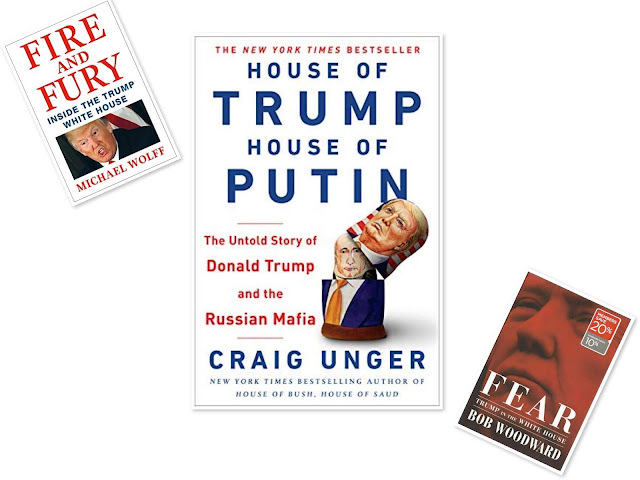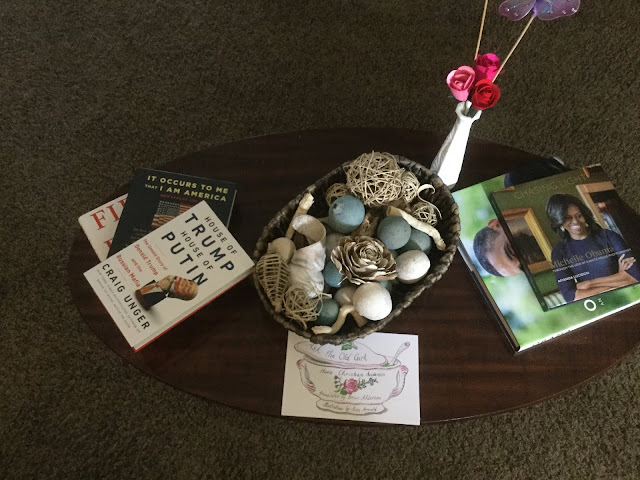Fear: Trump in the White House by Bob Woodward is the third book about Donald Trump that I have read this year. Fire and Fury was an account of the infighting inside the Trump White House during Trump's first 100 days. House of Putin, House of Trump was a roadmap of Trump's business ties with the Russian Mafia going back 40 years. Fear is a record of events and conversations that confirm that Americans have reason to fear while Donald Trump is still in the White House.
Woodward figured he would be writing a book about President Hillary Clinton. But two weeks before the election, he gave a speech in Fort Worth, Texas to 400 mostly white executives of a software company who were from all over the country. Woodward asked for a show of hands for whom they would vote for in the Presidential election: ten pairs of hands went up for Hillary; over 200 pairs of hands went up for Donald Trump. Woodward didn't know why, but he figured the polls had to be skewed. Two weeks later, Donald Trump was elected the President of the United States of America.
"Real Power is––I don't even want to use the word––fear." Donald Trump made that statement to Bob Woodward and Bob Costa in an interview on March 31, 2016. Woodward uses Trump's statement as the epigraph of this book. And he uses it again as a Trump quote on the back cover, with an image of Trump doing a fist pump. Moreover, Woodward uses Trump's words, "Real power is fear," on three different occasions in the book.
On page 175, Trump was giving advice to a friend who had admitted bad behavior towards women. Real power is fear. Trump told him that it was all about strength. Never show weakness. Never admit. "You've got to deny, deny, deny and push back hard on these women."
On pages 274 and 275, Woodward provided an insight into Trump's philosophy regarding tariffs and trade deals. Trump wanted to impose a 25 percent steel tariff and Gary Cohn was trying to talk him out of it. Trump said,"we'll try it. If it doesn't work, we'll undo it." Cohn said "You do something when you're 100 percent certain it will work, and then you pray like hell that you're right. You don't do 50/50s with the U.S. economy."
Still on pages 274 and 275, Woodward said that Trump wanted to blow up the NAFTA deal and renegotiate it. Trump's philosophy was "to get yes, you first had to say no." Cohn warned that it was too risky: "That either works or you go bankrupt." To Trump, Cohn thought, bankruptcy was just another business strategy. And Trump had gone bankrupt six times. Real power is fear.
On page 300 Woodward wrote about Trump's foreign policy, which Trump believed he was winning. Iran was under intense pressure, Pakistan was afraid that it might lose our aid, and South Korea was going to bow to Trump's demands for new trade talks. Then there was North Korea. Woodward writes that Trump's tweets about who had the biggest Button "may have come close to starting a war with North Korea in 2018." Woodward continues, "The public never learned the full story of the risks that Trump and North Korean leader Kim Jong Un took as they engaged in a public battle of words." Real power is fear.
On the next page, Woodward repeats a tweet from Colin Kahl, former deputy assistant secretary of defense under President Obama:
Folks aren't freaking out about a literal button. They are freaking out about the mental instability of a man who can kill millions without permission from anybody.Throughout the book, Woodward matter of factly reports certain actions the White House staff took to prevent Trump from causing harm to our country. And Woodward repeats their opinions of what they think of Trump, from calling him an idiot, to having the understanding of a fifth or sixth grader.
Woodward ends the book with Trump's lawyer John Dowd still believing that Trump did not collude with the Russians or obstruct justice, but resigning because Trump would not follow his legal advice about talking to Mueller. The last paragraph of Woodward's book is worth repeating:
But in the man and his presidency Dowd had seen the tragic flaw. In the political back-and-forth, the evasions, the denials, the tweeting, the obscuring, crying "Fake News," the indignation, Trump had one overriding problem that Dowd knew but could not bring himself to say to the president: "You're a fucking liar."________________________
Yes, real power is fear. And I am afraid.
Jerry Morris

















